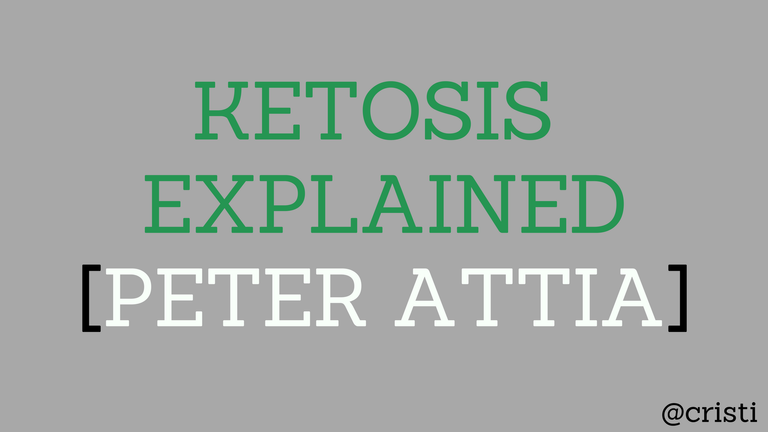
I've been talking a lot about ketosis on my steemit blog. Some of the posts have dealt with the science behind it, while others were simply videos in which I answered to questions related to ketosis.
My recent adherence to the ketogenic diet has increased my interest on the research side of it.
For those who do not know, ketosis is the metabolic state where your body switches its primary fuel substrate from glucose to fat and fat derived products, which are ketones.
Ketones replace sugar metabolism across many tissues and cells in the body, one the most important switch being probably in the brain, where from a glucose dependent brain it turns to using ketones in a proportion of 60 to 75%, while the rest is being provided by glucose (from gluconeogenesis) and other substrates.
To reach ketosis one has to drastically restrict dietary carbohydrate, to less than 50 grams (total carbs) per day or even less. And there are a lot of implications to this...
I'm still very very surprised that outside of a narrow research circle, ketosis and ketogenic diets have an inappropriate 'rap' and that there is a lot of misunderstanding about it, primarily because most people dismiss it using the simplistic and dangerous rationales, such as that it's a high-fat unbalanced diet - which can, in all truth be, without an appropriate and careful approach.
Moreover, given the current pace of the world, the state of ketosis is pretty much unsustainable by most people as you need to be extremely carefully with your carbohydrate intake and cheap, low-quality sources of carbs are everywhere.
I will write much more about ketosis in posts to come, but until then, I'd rather suggest a very good read (somewhat technical) by Peter Attia M.D., himself a practitioner of the ketogenic diet for a long time (now, on a low carb diet).
In his posts Attia discusses about:
- a definition of ketosis and the three ketone bodies
- how the brain switches from glucose to ketones and how it uses them for fuel
- what happens within the Krebs Cycle
- the process of ketogenesis
- the forever existing misunderstanding of the different between ketosis and diabetic ketoacidosis
This is a multi-part series of posts, so you can start with the first one by following the link below:
To stay in touch with me, follow @cristi
Cristi Vlad Self-Experimenter and Author
Cool intro o the topic! Thank you
It’s great to see someone who has been doing keto, also talking about the correct science underlying it :)
I’ve also done keto sometimes. Even for periods of months and it’s definitely amazing what you can achieve with it. There are some difficulties, specially in the beginning. But after that it’s great :)
How do you see the supposed necessity for a carb reload every now and then? (I imagine you’ll possibly talk about it in future posts)
Looking forward for your work!
Hi, thanks for the feedback. In my opinion, most of the time, there is no need for carb loading.
Thanks for your reply!
Yes, that's what I thought so also. although, I think it is important not to go too low on the <50g carbs rule. At least during a long period of time. Otherwise, the refeeds could be needed more often.
A very cool topic....i would love to know how the body produces ketones through ketosis......i have followed you and I would highly appreciate a follow back... Thanks for sharing such a detailed topic
The process is known as ketogenesis and is rather complex. I'll talk about that in the future.
Peter Attia has such insightful experiments about ketosis. I recall him talking about how he ate banana waffles with peanut butter post-fasted-exercise and his blood sugar plummeted. Comes to show how contextual it all is